Christians Writing Speculative Fiction Published In The General Market
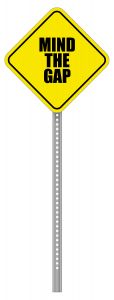 Several weeks ago author R. J. Anderson who has been a guest blogger here at Spec Faith, left a comment to my post “Who Reads Speculative Fiction?” regarding Christians writing fiction in the general market. She named a handful of authors, herself included, and said
Several weeks ago author R. J. Anderson who has been a guest blogger here at Spec Faith, left a comment to my post “Who Reads Speculative Fiction?” regarding Christians writing fiction in the general market. She named a handful of authors, herself included, and said
But none of these authors were published in the CBA, so many Christians looking for good speculative fiction don’t know enough to seek them out. It seems that between the Christian authors writing for the ABA and those writing for the CBA there is a great gulf fixed, and there are really very few resources out there to help readers close the gap.
The point of my article was that there seems to be a gap between readers and Christian speculative fiction published by Christian imprints, but I also agree with R. J. Besides the gap I identified, I think there is also a gap between Christians writing and publishing in the CBA, those doing so with independent presses, those self-publishing, and those publishing in the ABA. In other words, we are a somewhat fractured community. Rather than working in unity, we seem content to support and encourage only those who are like us.
How different that approach is to the one the Mormons take with writers such as Orson Scott Card, Shannon Hale, and Stephenie Meyer.
The issue is complicated, I’ll agree–Christianity itself is a rather lumbering bride with disjointed parts. We know we have unity of purpose and a future we will share, we know we are part of the same family, but some family members don’t talk to one another, and a few are considered black sheep. Add in this detail: not everyone claiming to be a family member actually is.
OK, so how do we sort this out? Or do we simply remain cloistered in our safe haven of the known and accepted People Who Are Like Us?
I’d say, for those who are reticent, for whatever reason, to read Christian speculative fiction, general market fiction written by Christians is a viable option. R. J. Anderson gave us a start by naming a handful of young adult writers.

Perhaps the newest is Jessica Khoury, a twenty-three year old from small-town Georgia writing young adult science fiction. Her debut novel, Origin, came out September, 2012. From the introduction to one interview: ” ORIGIN is about jungles and science, doing what’s right, and making sacrifices to do it.”
Veronica Roth, a native of Chicago, may be the best known of the writers R. J. named. Her debut novel Divergent, a young adult dystopian, opened in the top ten of the New York Times bestseller list. She has since published the sequel Insurgent, and the as yet untitled third in the trilogy is due out in October.
At forty-one, D. M. Cornish is the senior member of this group and hails from South Australia. He is the author of the young adult high fantasy Monster Blood Tattoo trilogy (Foundling, Lamplighter, and Factotum), known in the US and Canada as The Foundling’s Tale.
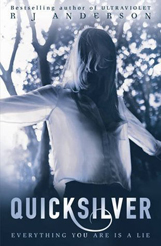 With six books to her credit and another due out in a year, Canadian R. J. Anderson is the veteran of the four. Her young adult novels include the fairy books *Knife, *Rebel, Arrow, Swift, and coming in 2014, Nomad. She’s also written the young adult science fiction/psychological thrillers Ultramarine and the just released Quicksilver.
With six books to her credit and another due out in a year, Canadian R. J. Anderson is the veteran of the four. Her young adult novels include the fairy books *Knife, *Rebel, Arrow, Swift, and coming in 2014, Nomad. She’s also written the young adult science fiction/psychological thrillers Ultramarine and the just released Quicksilver.
*Released in the US under the titles Faery Rebels: Spell Hunter and Wayfarer respectively.
R. J. doesn’t wear her Christianity on her sleeve a la Tim Tebow, but neither does she shy away from a discussion of her faith. For example, this from one of her online interviews:
Do you believe that there’s another world out there?
Well, as a Christian I believe in a supernatural realm which exists beyond the physical and is actually more, not less, significant than what we’re currently experiencing. I think that philosophy underlies all my stories — the idea of another world unknown to us but no less real because of it. But do other inhabited planets exist which support alien life? I think probably not — but it wouldn’t bother me if there were, either.
To this list I’d also add N. D. Wilson, who I profiled here at Spec Faith last July.
What Christians writing speculative fiction in the general market would you add? How can we support them, or do you see no need for Christians rallying around one another for that purpose?



































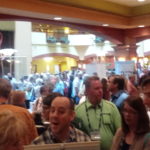
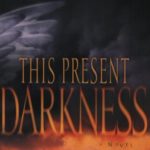
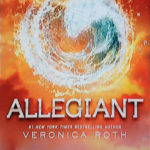




My friend Missy Lee writes for the general market (at least she did, I’m not sure if her new publisher would consider themselves strictly Christian or more general market). She writes some great YA paranormal romance (her first book is The Earth Painter). We met online over at the wherethemapends forum and I have supported her ever since her first book came out.
I’m not sure how to meet other authors, especially those who write for the ABA. I will confess I don’t even know everyone in the CBA. But when I meet them, I try to support them as much as I am able. I’m looking forward to the Realm Makers conference. I hope to meet more people there 🙂
Morgan, I realized as I wrote this post that the hardest part is knowing who is a Christian. I mean, unless someone is a member of a community such as you and your friend at Wherethemapends, it’s hard to know who is braving the trenches. That’s true for indie writers and self-published, but I think the latter two may actually have a better support network among Christians than do those published by a traditional ABA house.
I’m glad you’ve let us know about Missy–Melissa Turner Lee and The Earth Painter. She has a second one out called The Man Painter. Both are currently $2.99 on Kindle.
Becky
I think we should definitely be supporting all Christian authors of speculative fiction regardless of where and how they are published. I suspect these differences will matter less and less in the future.
Adam, I agree. For one thing, more and more of the Christian houses are owned by a general market publisher. Who’s to say there will a true Christian distinctive in the years to come? Plus, publishing is in the throes of this techno-revolution, so it seems even more imperative that Christians support one another. By “support” that includes prayer, which we can all do even if we don’t have the money to buy books or the interest to read them.
Becky
I had no idea Veronica Roth was a Christian. Interesting and cool.
I don’t know if it’s a good thing for your writing to be labeled Christian or not. In some ways, Christian fiction is “safe.” It all depends on who your audience is. Are you writing for other Christians? Is your purpose to encourage spiritual growth? Then the Christian market is a good place to be. Are you hoping to shed light in a dark world? Evangelize? Then the general market is the place to be.
Not so long ago, there weren’t distinctions. I’m rereading A Wrinkle in Time currently. The last time I read it was more than 30 years ago. And who do I find in the book? Jesus. The book is classic good vs. evil. Yet, no one goes around labeling Madeleine L’engle as Christian fiction. She even won a Newberry for it!
OK, I was digressing. I am happy to support/promote/read any Christian author, especially those who write great books with fantastic stories and a good message. I wish it was easier to tell who was a Christian in the mass market. 🙂
But then I think of Anne Rice who wasn’t Christian, then was, and now isn’t again. So even self-proclaimed Christians might not be Christian. I guess that’s where the CBA comes in. I’m hopeful that conferences like Realm Makers will blur the distinction.
Lisa, the first time I went to Veronica Roth’s blog, her bio included the line “I am a Christian.” She still has a post addressing an issue from a Christian perspective (which you can find in her FAQ section).
I think you’ve hit on a key term: “Christian market.” While many writers publishing with a Christian house have wanted to reach beyond a Christian audience, they’ve felt there was little opportunity to do that. These days, it seems clear that the wind of change is giving Christians a greater opening to publish stories for readers in general, not just for Christians.
Interesting that you mention Madeleine L’Engle. Some do count her in the ranks of Christians, but others, because of her universalist theology, don’t. She, indeed, is a perfect example why it’s hard for Christian readers to intentionally support Christian writers. It’s hard to know precisely what the person’s beliefs are.
I didn’t find a single statement by Jessica Khoury, for instance, that said she was a Christian. I think in one interview she said her faith was an influence (among other things she listed) in what she wrote, but she never said what that faith was. However, she attended a Christian college, which is hardly something someone does unless they’re a Christian (unless they’re on athletic scholarship–which could have been the case because she played soccer). Coupled with the fact that she wrote about “doing what is right and making sacrifices to do it,” we have R. J.’s word, who directly communicated with her.
I think it would be awesome if the Realm Makers conference extended to writers pursuing publication in the general market, too, or ones already published there!
Becky
I actually read Divergent and called it Covert Christianity in my review. It was great to see prayer, scripture, and Christian elements in such a popular book.
Not so long ago, I had a position of authority with a local writers’ group. I was shopping around for speakers, and was approached online by a Christian writer who was self-published. She went into a series of intense and slightly terrifying diatribes about how awful the CBA is, especially for anyone who wants to write something edgy and speculative.
Do I agree with her? Not so much. Does she have a point? Well, there does seem to be a certain amount of sticking to the status quo mentality. Did her bitterness affect my decision not to ask her to meet with our group? Absolutely. (I was blessed that some other members of the group knew her through other venues, and supported the decision.) The lines between readers and writers, professionals and fellow servants, champions and enemies–these are really blurry. We humans tend to love our little circles. “You may enter our circle, we’d like it to be bigger, but don’t be different from us. Please. Just go over there if you’re not going to be just like us. We’re already established.” Re-establishing our limits and boundaries seems to get harder, not easier, the longer we live. I think you’re right, smaller circles are NOT the answer, but people are hard to herd. “Unity in the Spirit” should make relationships easier. And we fall into ruts too often.
I wish I could think of some more names to add to your list (I already know and love Missy’s work!). I’ve come across some wonderfully wholesome secular fiction with not a whiff of Jesus in it, and some intensely edgy “Christian” fiction that made me want a shower. I have a hard time finding out about the many, many self-published authors, much less getting my grubby hands on the books. I think Tor has the right idea about how to approach this. Like you, I wish there were a more comprehensive and consolidated way to get the information out.
😆 Harder than cats, so I’ve heard.
In reality, I don’t want to herd anyone, but I want everyone to feel welcome. And yet, we at Spec Faith have our lines drawn, too. We have a statement of faith that the regulars involved with our site agree to. We put it together with the idea that these are the basics that define what a Christian is, but clearly that does draw a line. However, I’m hopeful that we can span the gap between those who are choosing diverse avenues in publishing because we have a common goal and purpose.
Becky
[…] Recommended Article FROM http://www.speculativefaith.lorehaven.com/2013/04/08/christians-writing-speculative-fiction-published-in-the-g… […]
Cindy Koepp is another:
http://www.amazon.com/Remnant-Stars-Cindy-Koepp/dp/1934153311/ref=sr_1_1?ie=UTF8&qid=1365470859&sr=8-1&keywords=remnant+in+the+stars
Thanks, Aaron. Good to know about Cindy.
Her book is Remnant in the Stars, and as you might guess, is science fiction:
That should come as welcome news to many a sci fi fan.
Becky
These days Kathy Tyers mostly partners with Marcher Lord, but you can still find a lot of her other stuff (including Star Wars!) in the general sci fi section. Before being reprinted a couple times her Firebird novel was published by Bantam.
Thanks for reminding us about Kathy Tyers’ work, Emma. Yes, she first published in the general market. I don’t know what she’s hoping for in the future. That would be a good thing to ask her to talk about if she guests here at Spec Faith again.
Becky
If you’re including graphic novels, these guys:
http://www.makingcomics.com/2012/01/30/doug-tennapel-ethan-nicolle-on-making-comics-8-part-1/
Two part interview – very very interesting. Some of it is comic-specific, but a lot that is just as relevant to writing books without pictures. They get into a lot of deep stuff which is incredible since the site is not aimed at Christians at all.
I appreciate the idea of supporting other Christian writers, always. It’s great to have articles like this to raise awareness of Christian authors we might not be aware of.
Depending on the situation, however, I don’t know how helpful it is to try and delineate an author’s faith. What if they don’t want people to know they are “Christian”? In our currently polarized climate, it is common for people to put someone in a box the moment they hear that person is “Christian” — or the moment they hear that person is “liberal”. Or “Pentecostal”. Labels can be harmful as well as helpful.
If the author themselves don’t state their religion on their website, it might be nice to respect that and not label them. And if so, how then do we support them?
Perhaps we index books not so much by the religion of the author as by the worldviews and themes presented in the books themselves.
For example, I might heartily recommend Orson Scott Card’s “Ender’s Game” to anybody who likes a good sci-fi story… but would want to make sure that it was clear the story contained a lot of violence, so that parents like myself can make an informed decision about things their kids are reading. Another example: I might not like L. Ron Hubbard’s religion, but I was absolutely delighted with “Battleship Earth”. I can’t think of a single other book of his that I’d recommend to anyone, but that one I’m planning to read to my children someday.
There may yet be a way to promote “good books” whether or not we state specifically it’s because the author is Christian. I’m eager to support authors who write good books. Even if the author isn’t Christian, if they’re writing a book I enjoy and feel is a good addition to the world’s library, wouldn’t I still support them in hopes that they’ll write more of the same?
Networks of like-minded people like those who gather here at SpeculativeFaith.com may become increasingly influential in the online world. No doubt as we share information with each other, recommending books to each other, in blogs and on Facebook and other social media, the word will spread.
Such an interesting topic to think about. Thanks for bringing it up, Becky!
Interesting discussion. So many good points. I love speculative fiction but when I sit down and take account of just why I don’t read more Christian spec fiction than I do, it comes down to two things: preference and not knowing what is out there. I’m grateful for sites like Spec Faith that give a place to these books, but man, for those of us who still like to scrounge through bookstores, shrinking shelf space is a problem.
And then, like so many have already mentioned, speculative fiction is a HUGE category. Within that category, we all have our preferences and there are some wonderful Christian authors whose work just does not appeal to me. I’m certain some feel the same way about mine.
With that in mind, I do appreciate your earlier comment, Becky. We should be praying for one another and the other Christian writers out there. With such an internally fragmented community, it’s the best way I know to bring unity.
Thanks for doing this. I would suggest that Elizabeth Moon and Connie Willis should be considered Christian writers published (and awarded by) the general market.